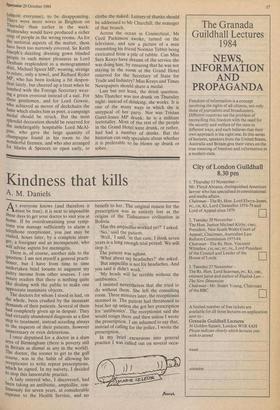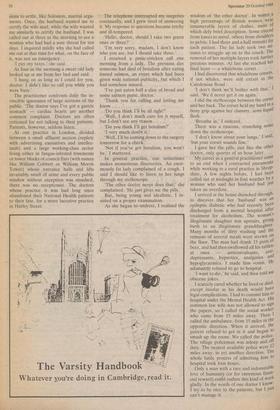Kindness that kills
A. M. Daniels
As everyone knows (and therefore it As be true), it is next to impossible these days to get your doctor to visit you at home. If by overdramatising your symp- toms you manage sufficiently to alarm a telephone receptionist, you just may be visited, hours later, by a complete stran- ger, a foreigner and an incompetent, who will advise aspirin for meningitis. There is, of course, another side to the question. I am not myself a general practi- tioner, but I have from time to time undertaken brief locums to augment my Paltry income from other sources. I can assure readers that there is nothing quite like dealing with the public to make one appreciate inanimate objects. The doctors for whom I stood in had, on the whole, been crushed by the incessant demands of their patients. Several of them had completely given up in despair. They had virtually abandoned diagnosis as a first step to treatment, instead acceding always to the requests of their patients, however unnecessary or even deleterious. I once deputised for a doctor in a slum area of Birmingham (there is poverty still in Britain as dismal as any in the world). The doctor, the sooner to get to the golf Course, was in the habit of allowing his receptionist to write repeat prescriptions, which he signed. In my naivety, I decided to stop this lamentable practice.
A lady entered who, I discovered, had been taking an antibiotic, ampicillin, con- tinuously for seven years, at considerable expense to the Health Service, and no benefit to her. The original reason for the prescription was as entirely lost as the origins of the Tiahuanaco civilisation in Bolivia.
`Has the ampicillin worked yet?' I asked. `No,' said the patient.
`Well,' I said, `in that case, I think seven years is a long enough trial period. We will stop it.'
The patient was aghast. `What about my headaches?' she asked. `But ampicillin is not for headaches. And you said it didn't work.'
`My heads will be terrible without the antibionics.'
I insisted nevertheless that she tried to do without them. She left the consulting room. Three minutes later, the receptionist stormed in. The patient had threatened to beat her up unless she got her prescription for `antibionics'. The receptionist said she would resign there and then unless I wrote the prescription. I am ashamed to say that, instead of calling for the police, I wrote the prescription.
In my brief excursions into general practice I was called out on several occa- sions to settle, like Solomon, marital argu- ments. Once, the husband wanted me to certify the wife mad, while the wife wanted me similarly to certify the husband. I was called out at three in the morning to see a woman who had had a sore throat for ten days. I inquired mildly why she had called me out at that time for what, on the face of it, was not an emergency.
'I pay my taxes,' she said.
At four in the morning a sweet old lady looked up at me from her bed and said: 'I hung on as long as I could for you, doctor. I didn't like to call you while you were busy.'
The practitioner confronts daily the in- vincible ignorance of large sections of the public. `The doctor says I've got a gastric stomach' — cardiac hearts are another common complaint. Doctors are often criticised for not talking to their patients. Patients, however, seldom listen.
At one practice in London, divided.. between a small affluent section (replete with advertising executives and intellec- tuals) and a large working-class sector living either in fungus-infested tenements or tower blocks of council flats (with names like William Cobbett or William Morris Tower) whose entrance halls and lifts invariably smelt of urine and every public window without exception was smashed, there was no receptionist. The doctors whose practice it was had long since abandoned their National Health patients to their fate, for a more lucrative practice in Harley Street. The telephone interrupted my surgeries continually, and I grew tired of answering it. My response to questions became tetchy and ill-tempered.
'Hello, doctor, should I take two green ones or three?'
'I'm very sorry, madam, I don't know who you are, but I should take three.'
I received a panic-stricken call one morning from a lady. The previous day someone had died of botulism after eating tinned salmon, an event which had been given wide national publicity, but which I had somehow missed.
'I've just eaten half a slice of bread and some salmon paste, doctor.'
'Thank you for calling and letting me know . . .
'Do you think I'll be all right?'
'Well, I don't much care for it myself, but I don't see any reason . . .
'Do you think I'll get botulism?'
'I very much doubt it.'
'Well, I'll be coming down to the surgery tomorrow for a check.'
'Not if you've got botulism, you won't be,' I muttered.
In general practice, one sometimes makes momentous discoveries. An enor- mously fat lady complained of a cough. I said I should like to listen to her lungs through my stethoscope.
`The other doctor never does that,' she complained. 'He just gives me the pills.'
But, being young and idealistic, I in- sisted on a proper examination.
As she began to undress, I realised the wisdom of 'the other doctor'. In winter a high percentage of British women wear innumerable layers of clothes, most of which defy brief description. Some extend from knees to navel, others from shoulders to pelvis. I had three and a half minutes for each patient. The fat lady took two rim nutes to struggle up on to the couch. The removal of her multiple layers took further precious minutes. At last she reached her final layer — a whalebone corset.
I had discovered that whalebone corsets, if not whales, were still extant in the Caledonian Road.
'I don't think 'we'll bother with that: I said. 'We'd never get it on again.' I slid the stethoscope between the corset and her back. The corset held my hand ina bony grip against her clammy, semi-liquid flesh.
'Breathe in,' I ordered.
There was a raucous, crunching noise down the stethoscope. 'I don't know about your lungs,' I said, 'but your corset sounds fine.' I gave her the pills, just like the other doctor, only quarter of an hour later.
My career as a general practitioner came to an end when I contracted pneumonia while working in a rural practice in Shrop- shire. A few nights before, I had been called out at midnight in foul weather by a woman who said her husband had just taken an overdose.
I arrived at the house drenched through, to discover that her 'husband' was an epileptic diabetic who had recently been discharged from a mental hospital after treatment for alcoholism. The woman s illegitimate daughter was upstairs, giving birth to an illegitimate granddaughter. Many months of dirty washing and the remains of several meals were strewn on the floor. The man had drunk 15 pints of beer, and had then swallowed all his tablets at once — anticonvulsants, anti- depressants, hypnotics, analgesics and hypoglycaemics. I made him vomit. He adamantly refused to go to hospital.
`I want to die,' he said, and then told me obscene jokes. I scarcely cared whether he lived or died, except insofar as his death would have legal complications. I had to commit him to hospital under the Mental Health Act. His common law wife was not allowed to sign the papers, so I called the social worker who came from 15 miles away. Then I called the ambulance, from 15 miles in the opposite direction. When it arrived, the patient refused to get in it and began to smash up the room. We called the police. The village policeman was asleep and Of duty. The nearest available police were 12 miles away, in yet another direction. The whole futile process of admitting him to hospital took four hours.
Only a man with a rare and indomitable love of humanity• (or for enormous finan- cial reward) coald endure this kind of work gladly. In the words of one doctor I know: I try to he nice to the patients, but I just can't manage it.



















































 Previous page
Previous page